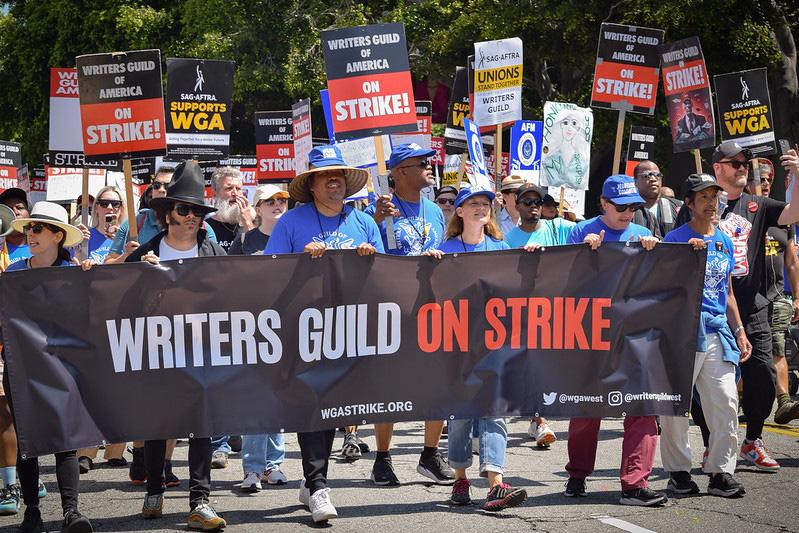Hollywood writers strike concludes, actors begin negotiations with executives
 THE WRITERS GUILD OF AMERICA was joined by the Screen Actors Guild on the picket-line. The last time they were on strike at the same time was 1960. PHOTO courtesy of ufcw770 via Flickr
THE WRITERS GUILD OF AMERICA was joined by the Screen Actors Guild on the picket-line. The last time they were on strike at the same time was 1960. PHOTO courtesy of ufcw770 via Flickr
Writers and actors have been on strike in Hollywood for nearly five months, but it seems the end credits are poised to start rolling any day now.
The tension between writers and executives in Hollywood has been brewing since March 20, 2023, when contract negotiations for the next three-year period began. When it became clear new contracts were not going to offer what they wanted, members of the Writers Guild of America started to feel restless.
On April 3, a vote to authorize a strike went out to writers in the union. Two weeks later, on April 17, results were tallied. 97.85% of members had voted “yes,” making it clear that a strike was imminent.
The WGA strike began on May 2, 2023 and stretched on long enough that by July 14, members of the Screen Actors Guild joined them on the picket lines. Members of both unions sought higher wages and better working conditions, along with another issue that largely echoed the concerns brought to the table by the last WGA strike in 2007: residuals.
With the rise of streaming services, the format of production has shifted, leaving writers with fewer job opportunities and lower pay.
“The issues are greater, and there’s more at stake now,” said Michelle Wright, a producer who worked on the second and third seasons of “Bridgerton.” “It’s about pay…and it’s about residuals, which we’ve always had before…but now with the new streaming services, that model doesn’t work.”
The dwindling job market paired with a rise in demand has members of both unions worried about artificial intelligence. Writers and actors alike are calling for regulations to be placed upon the developing technology, wanting to ensure that their jobs don’t fall to machines.
“There’s infrastructure in place that covers this present technology and anticipates what they can right now,” said Ben Godar, the executive director of Des Moines Film Society, which renovated the Varsity Cinema. “Every few years the technology evolves, and essentially it seems like there almost has to be a work stoppage for the contracts to evolve and deal with that.”
When the strikes first began, Hollywood executives stated that their plan was to simply wait them out, expressing the sentiment that once writers’ leases were up and they didn’t have the money to renew them, they would readily agree to anything the studios offered.
“[The strike] has definitely affected everybody because it’s been going on for five months and…we’re not working,” Wright said. “It’s affected some worse than others…it’s a trickle down effect because it’s not just the people that make the movies, it’s also the people that provide lumber for sets, electrical, costumes [and] prop houses. There’s a lot of people that are affected by the industry.”
As weeks stretched into months and it became clear that the unions were not going down without a fight, the Alliance of Motion Picture and Television Producers, a trade organization that negotiates on behalf of executives, stepped in.
The AMPTP and the WGA met for the first time in mid-August to discuss the union’s terms for ending the strike. It took until Sept. 24 for the two groups to reach a tentative compromise.
On Sept. 27, the writers’ strike was declared officially over as the WGA voted unanimously to recommend the newly revised contract called the Minimum Basic Agreement to union members. Members will now have until Oct. 9 to ratify the agreement, but they will be allowed to return to work in the meantime.
The tentative agreement places considerable pressure on SAG-AFTRA to wrap up their own negotiations. The actors’ union met with AMPTP on Oct. 2, which marked the first time the groups have spoken since SAG-AFTRA declared their strike in July.
As conversations regarding the film industry continue, the issues unions are fighting for have a wider reach than those in Hollywood.
“I think it is an important reminder that these are real people and real artists that are making the work that [people are] seeing,” Godar said. “If they’re not protected in a way that they can earn a quality living…this art that they see is not going to continue to exist.”
